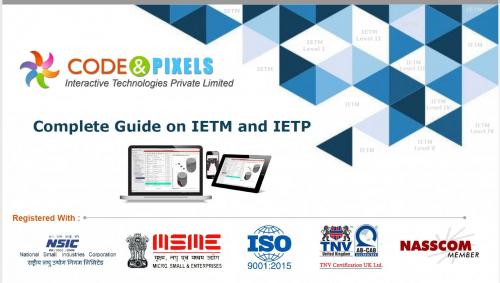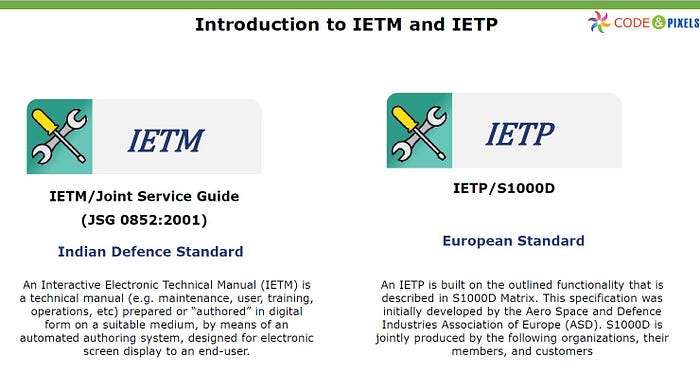Introduction to IETM and IETP (JSG-0852 and S1000D)

Technical manuals (e.g. maintenance, user, training, operations, etc.) published in electronic format are becoming more and more popular than paper-based manuals for their interactivity, convenience, and ease of use.
For example, the maintenance and operation manuals of a warship, which used to occupy 300 -350 sq. feet of prime area with thousands of pages of technical literature
It is difficult to refer to some operating process or troubleshooting from thousands of hardcopies
To address these issues IETMs were introduced
IETMs are a portable, electronic “library” that contains thousands of pages of documentation and images, Videos, and allows end-users to trace technical documentation in a more efficient manner, and the digital nature provides a more agile and accurate method of updating technical documentation.
• Level 0 :- Scanned Image / Digital format
• Level 1: Simple PDF with multiple pages
• Level 2: PDF with hyperlinks to index along with Images.
• Level 3: HTML-based pages, similar to a website, where all the content is presented HTML pages along with a Table of content at onside. Linear format following the logic of the content. Next previous buttons with very limited search functionality
• Level 4: Advanced IETM with database, and user management, Powerful search and Content, and Document management facility.
There are two specifications/standards that exist.

IETM — (JSG 0852:2001)
Standards are Designed and Developed by the Directorate of Standardization Department of Defense Production. Ministry of Defense, New Delhi
Guidelines Framed by:
Stakeholders and steering committee:
Army, Navy, Air force, Scientist of Defense labs, Capt., Lt. Cdr from various organizations
Labs: BEL, ADG systems, NHQ, ACAS, HAL, BDL, GRSE, Goa Shipyard, MIDHANI, MDL, BEML, DQAL, Dte Standardization, CQA, DS cell Bangalore, etc.
IETP — S1000D
Stakeholders and steering committee:
Jointly produced by Aerospace and Defense Industries Association of Europe (ASD), Aerospace Industries Association of America (AIA), and ATA e-Business Program.
JSG — 0852: 20001
1. Needs Raw content to covert to SQL Database
2. HTML/SGML as source file
3. IETM has an inbuilt Authoring tool, Content management tool, User Management, and reporting
4. Works in Standalone and Client-server mode
5. IETM has Viewer and Administrator and Author Modules
6. Content can be edited by OEM without any tool
7. In short, OEM need not have any software to deploy IETM.
S1000D:
- Needs Raw content to covert to XML Database
- XML as a source file
- OEM or the place IETM is being deployed must have a CSDB webserver to host the Data Modules/ s1000d XML files to have user management and content management.
- The vendor gives s1000d files to OEM. If OEM has a CSDB studio server then IETP can be hosted on that server. Otherwise, it plays in a standalone machine as a Viewer.
- OEM needs an S1000d author tool, commercially available off-the-shelf software to edit.
- OEM must have an s1000d CSDB server to deploy s1000d files. If no CSDB Server is available then S1000d can still be viewed in Viewer without any Administration tools.
Common Source DataBase — CSDB
In S1000D Documentation, 2 software’s are used
Authoring Tool:
• It is like in simple words, MS word, where we write the content and put images, etc.
• IN MS word its .doc file, in S1000D, it’s XML Data Module.
• In this authoring tools we need to write content in S1000d defined XML Tags, so that all the documents designed by all the OEMs will be in the same lines across the globe.
CSDB SERVER
• This is server software that stores all the databases and also tracks versions and manages Data modules
• S1000D needs some codes so that every Data Module has a unique code.
• CSDB server creates these unique codes automatically.
• Helps in publishing IETMs, PDFs, and Source XML files
Major advantage of s1000d
• Let’s say each ship is built by has 50 OEMs and all 50 OEMs supply IETMS in different formats, then it will be difficult to maintain uniformity.
• If all 50 vendors give the end-user s1000d IETMs then all the IETMs will almost in a similar format.
• To achieve this, the end-user must have an S1000d CSDB server with them to host all the files received by various vendors.
• If Navy/IAF/Army do not have CSDB suit then, still they can run IETM, but a standalone version where no user management will be done by IETM Viewer.
• (User management will be done by end-users CSDB Local server which hosts all the data modules of various OEMs)
S1000D and its basic principle
- Content or data produced following the standard is in Data Module
- This data module is the smallest and self-contained content or data unit within a technical publication
- A data module must have sense and meaning when viewed without any supporting data other than images and diagrams
- These data modules will be stored and managed in CSDB, Common Source Database
- Using this CSDB we can publish output in a page-oriented or Interactive Electronic Technical Manual
- These Individual data modules are re-usable components and can be used repeatedly in an output.
Benefits of S1000d?
One of the greatest advantages of S1000D is
In JSG 0852 IETM, first, documentation has to be done in JSS 251 format, in MS word then IETM activity starts.
In S1000D, Separate documentation need not be done. Whatever we do in MS word will be done using s1000d Author software.
Once all the documentation is done, we can simply export them either as PDF or as IETM or XML files with Project manifest file so that these can be deployed in any other S1000d distribution servers/ CSDB studios of the end-user (Navy/IAF/Army)
- Reusability of data hence reduces production cost
- Standardization of data and naming conventions
- Open source and non-proprietary
- Good for legacy data conversion
- Proper documentation and version control management
- Zero printing cost and zero occupancies of space as no Hard copies are to be maintained. Achieved by reusing instead of recreating information each time it is required
- Easily to maintain and distribute: Facilitates transfer of information and electronic output between systems very easily and conveniently
- Multiple Vendor support
- Fastest reference to operator or maintainer than traditional paper-based documents
- Many different output forms can be generated from a single data source i.e. from CSDB we can generate IETM and also PDF format which can be used for printing if need be
- Customized Output creation: Allows sub-sets of information to be generated to meet specific user needs and user levels.
Common information sets provide the following data: -
- Crew/Operator information
- Description and operation
- Maintenance information
- Wiring data
- Illustrated Part Data (IPD)
- Maintenance planning information
- Mass and balance information
- Recovery information
- Equipment information
- Weapon loading information –
- Cargo loading information
- Stores loading information
- Role change information
- Battle damage assessment and repair information
- Illustrated tool and support equipment data
- Service bulletins
- Material data
- Common information and data
- Training
- List of applicable publications
- Maintenance checklists and inspections
Post Your Ad Here
Comments